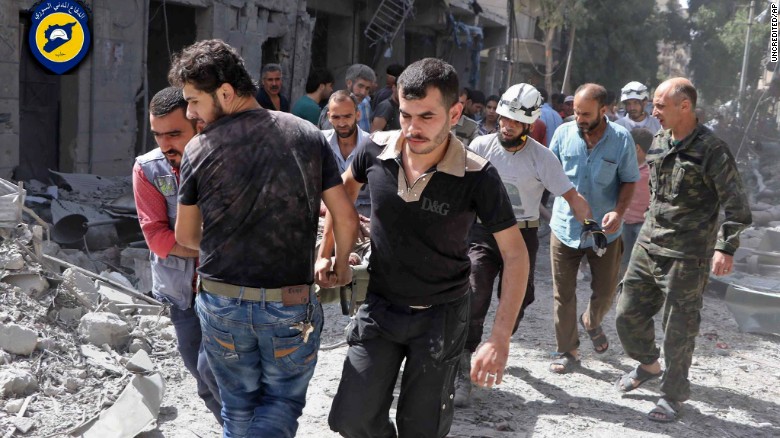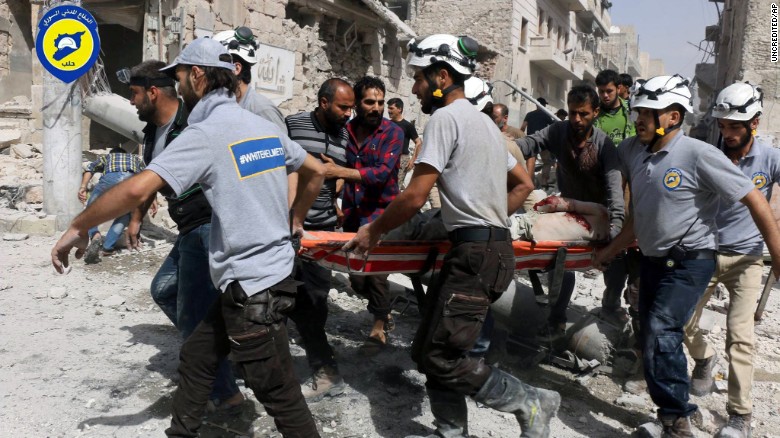Intense and ongoing airstrikes targeting rebel-held eastern Aleppo on Thursday killed 20 people and destroyed the Syrian city’s main water pumping station, an activist with the opposition-aligned Aleppo Media Center (AMC) told CNN.
The military operation, conducted by Syrian forces, formally marks the end of a short-lived ceasefire that sought to quell violence, coordinate efforts to defeat ISIS and allow aid to enter the besieged city.
Syria’s military announced the “start” of military operations in eastern Aleppo, warning residents to keep away from specific sites and centers of “armed terrorist groups,” according to state-run news agency SANA.

Activists say allied Russian forces have also participated in the strikes, though Moscow has not confirmed its involvement.
Airstrikes that were halted during the ceasefire resumed this week in eastern Aleppo, according to the AMC activist.
The water station destroyed late Thursday provided clean water to both regime and opposition-controlled neighborhoods in Aleppo, the activist added.
Syrian forces bombarded several neighborhoods in eastern Aleppo on Thursday night, killing 20 people, the activist said. Five of the victims were in al-Sukkari and 15 others in Bustan al-Qasr and Kallasseh.

Wednesday’s toll was even higher, the activist said, with least 50 people being killed and others injured after Syrian forces struck almost every neighborhood in eastern Aleppo and in the countryside.
Other targeted neighborhoods included al-Fardous, where at least four people were injured; and al-Qateri, where a series of airstrikes left residents trapped underneath rubble, another AMC activist told CNN.
That activist described the airstrikes as being far more intense and destructive than they were prior to the ceasefire.
Short-lived ceasefire
The fragile ceasefire that went into effect on September 12 fell apart less than a week later after US-led coalition forces struck a Syrian position, killing scores of soldiers.
The US military did not dispute the strike, but characterized it as “unintentional” and relayed its “regret” to Syria through Russia.
The strike erupted in a diplomatic row between the US and Russia, the ceasefire’s brokers, at an emergency meeting of the United Nations Security Council on Saturday.
Russian Ambassador to the UN Vitaly Churkin said the strike was “an extraordinary display of American heavy-handedness” and accused the US of purposefully derailing coordination efforts.
US Ambassador Samantha Power hit back, describing Russia’s reaction as “a stunt replete with moralism and grandstanding” that was “uniquely cynical and hypocritical.”
One day later, Syrian forces carried out several strikes against rebel strongholds in eastern Aleppo.
Syrian President Bashar al-Assad on Thursday said the US is not interested in a ceasefire, but that his government is ready and willing to commit to one.
“I believe that the United States is not genuine regarding having a cessation of violence in Syria,” he told SANA.
US Secretary of State John Kerry responded with a call on Syria and Russia to end aerial bombardment of eastern Aleppo, stating that there was “no chance” of peace without an end to military operations and coordination between the parties.
Speaking on the sidelines of the General Assembly meeting in New York, Kerry said the ongoing strikes in Aleppo are “exactly the kind of regime action that has done so much damage to this process and to the credibility of the concept of restraint or ceasefire.”
Obstacles to aid
An airstrike on Monday destroyed a Syrian Arab Red Crescent (SARC) aid convoy in Urum al-Kubra, west of Aleppo, prompting the United Nations to halt its aid operations in Syria.
The strike killed about 20 people, including the Red Crescent’s regional director Omar Barakat, said the International Committee of the Red Cross. The United Nations added that 18 of the convoy’s 31 trucks were damaged in the bombing.
No party has claimed responsibility for the strike. However, the US has blamed Russia.
“All of our information indicates clearly that this was an airstrike. That means there only could have been two entities responsible,” US Deputy National Security Adviser Ben Rhodes said Tuesday, referring to Russia and Syria.
“We hold the Russian government responsible for airstrikes in this airspace given their commitment under the cessation of hostilities was to ground air operations where humanitarian assistance was flowing,” Rhodes said.
Russia has denied carrying out the strike, instead charging that the convoy was hit by a “terrorists’ pickup truck carrying a large-caliber mortar,” according to Russian state news agency Tass.
A convoy of trucks carrying humanitarian aid did reach the besieged town of al-Muadamiyah in the Damascus countryside, a UN spokesperson told CNN on Thursday. It’s an interagency humanitarian effort of the UN and SARC, carrying aid for 7,000 people, according to a tweet from the SARC.
Syrians in eastern Aleppo and other besieged cities and towns are facing a dire shortage of food, medicine and other supplies. The country’s civil war, which is in its fifth year, has so far claimed the lives of more than 400,000 people and sparked a refugee crisis, according to the UN.
As reported by CNN
